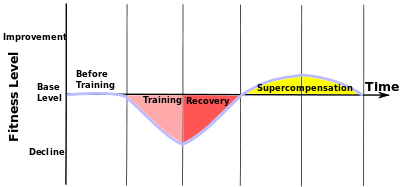"That which does not kill us makes us stronger"
- Freidrich Nietzche
In its most basic explanation, lifting weights makes us stronger. What exactly does that mean? By lifting weights our muscles get better at doing their job (moving our bones around), our tendons and ligaments get better at supporting our skeleton, our central nervous system becomes more efficient, and our bones become more dense, just to name a few.
How does it do this? The Adaptation* process has a few distinct parts - Progressive Overload, Recovery and Supercompensation. Put simply, we lift something heavy and our body (a very general term for our entire being) is challenged and sustains a small amount of trauma - this is Progressive Overload, as we are progressively overloading our body. In the time proceeding this, our minutely damaged body goes into Recovery mode where it repairs itself to be able to complete that given task the next time around - leading into Supercompensation. This means your body is now capable of more than it was before the Progressive Overload stage, and can now be overloaded again thereby inducing further supercompensation.
In theory, if i pick my mum up and do 10 squats to failure with her draped across my shoulders on Monday, i will be sore for the next two days, but hopefully and just maybe, i will be able to do 11 squats to failure on the Thursday.
 |
| Progressive Overload, Recovery and Supercompensation. |
Why does this occur? Because our body is so awesome! We are an adaptive organism and as such our system needs to respond to the demands which are placed on it. Without it, we would have perished a long, long time ago. Its how we can hold our breath underwater for minutes on end, run 100km marathons, deadlift 500kg, and run 100m in under 10 seconds - at least some of us.
The timeline of the process will differ depending on the experience of that individual. If we take an untrained individual, the timeline over which their body will complete the adaptation process will generally be quite short. If you've never done a bodyweight squat before then chances are you will be very sore after doing 10 of them for the first time, but a few days later when the pain has subsided and you return to train, you will most likely exceed this number without much trouble - if you did 12 squats 3 days later, thats a 20% performance improvement in a matter of days!
 |
| This graph shows the adaptation process dependant on athletes experience. |
In a highly trained individual, the adaptation process can take much, much longer and encompass a much more complex approach to supercompensation. Using a well experienced weightlifter as an example, an increase of 10kg for a back squat in one year would be a considerable improvement. If the given weightlifter can squat 200kg for a single repetition, then 10kg in the space of a year would represent an improvement of 5%. Relatively slow going in comparison...
 |
| This is Pisarenko |
Besides experience, what can affect this process of adaptation? Rest, nutrition, stress levels, injuries - all of these things will have an influence on how quickly and effectively you are able to, or not able to adapt. Getting good rest each night, eating plenty of clean food and making sure you manage the stress of life as best you can will put you in the best position to adapt fast and come back stronger!
What can you take from this? A brief understanding of how we adapt to things, and something to help you gauge your personal improvement. If you're new to strength training then you should revel in the fact that your body will be making gains in leaps and bounds. If you are a more experienced athlete then your expectations of your body's ability to adapt should be more realistic, and you should understand that you probably wont be breaking records at every single workout. That doesn't mean you shouldn't try..
Joe
* There are other factors that determine our relative strength, notably skill development. If i don't know how to squat, then i will undoubtedly become infinitely better and stronger at doing it as i learn the skill of the movement. This is mostly due to the neurological adaptation of acquiring a new skill and will also be a period of rapid improvement. Very well summed up by Pavel Tsatsouline when he said that "strength is skill".
No comments:
Post a Comment